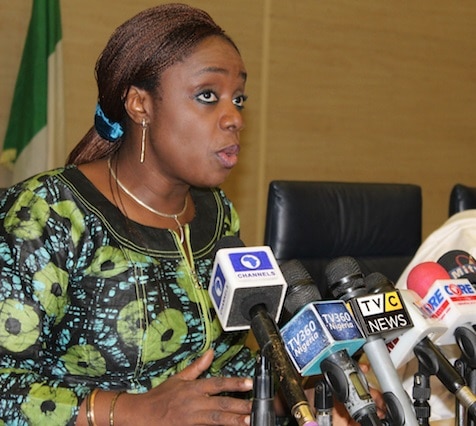The Minister of Finance, Mrs Kemi Adeosun has urged importers and exporters in Nigeria to take advantage of the enabling business environment being created by the present government to engage in formal trade and expand the volume of export without flouting the best practices.
Adeosun said that President Muhammadu Buhari administration has made commendable efforts to remove all identified physical and administrative bottlenecks based on the past experiences and lessons.
The minister stated this in a keynote address on Thursday at the Sensitization Workshop tagged: Understanding the Nigerian Revised Import and Export Guidelines, Procedures and Documentation Requirements for ease of doing Business in Nigeria.
The workshop was organised by the Federal Ministry of Finance in collaboration with the Technical Committees on Nigeria Export Supervision Scheme (NESS) and Comprehensive Import Supervision Scheme (CISS).
She said that some of the measures introduced by the present administration to facilitate trading across Nigerian borders include: reduction of documentation requirements from 10 to seven for export and from 14 to eight for import. Adeosun added that additional responsibilities have been given to the Nigeria Customs Service (NCS), Nigeria Ports Authority and Shipping lines and other Carriers while sanctions have also been introduced to enforce compliance.
Some of the additional responsibilities are: NCS shall coordinate the Mandatory Joint Examination and sign-off Form within the official working hours, including Saturdays; and shall make available the Shipping Manifests to other examination Agencies as soon as they are received to enable enough time for Risk Assessment.
Nigeria Integrated Customs Information System (NICIS) should be strengthened to accommodate more Agencies while the Shipping Lines shall transmit to the NCS and Nigeria Ports Authority (NPA) the cargo manifest before leaving the last Ports of call to Nigeria; and shall ensure that Nigeria bound containerized cargo are palletized.
The sanctions introduced with respect to export is to ensure timely payment of NESS levy and repatriation of export proceeds within the prescribed period, forestall sharp practices by Banks, as well as compelled the government-appointed Preshipment Inspection Agents to ensure timely scheduling of inspection and issuance of Clean Certificate of Inspection (CCI), regular monthly reporting, confirmation of proper documentation of export by the exporters and forestall export of substandard goods from Nigeria.
From the foregoing, it is explicit that the exporters, ADBs, and PIAs have critical roles to play for the achievement of facilitating trading across borders.
Furthermore, in order to ensure quick clearance of import at the Nigerian ports and borders, the additional responsibilities assigned to the relevant Government Agencies would be carried out in a well coordinated and collaborative manner, while the sanctions specified for non-compliance with the provisions of the Guidelines would be strictly and impartially applied across board.
Let me add that Government is working relentlessly to quickly put in order the scanning system so as to eliminate manual examination of goods and the associated delays, the minister stated. Adeosun added that the efforts of the present government led by President Muhammadu Buhari towards ensuring ease of business have started yielding dividends in some areas, saying though much still have to be done in other areas.
Earlier in his address, the Permanent Secretary of the Federal Ministry of Finance, Dr Mamoud Isa-Dutse said that the present administration was also taking steps towards ensuring 24 hours clearance of cargo using cutting-edge technology.
He maintained that efforts were ongoing to revive and upgrade the scanning system as a short-term measure, pending the acquisition of modern High Definition Scanners.
The Permanent Sceretary therefore, solicited for the cooperation of all individuals and business entities involved in export and import trade to abide by the provisions of the Guidelines. Let our efforts in striving to create a lucrative business environment in Nigeria be mutually-reinforcing to enable us as a country make significant progress.
We are duty-bound to foster formal trade not only to block loopholes for leakage of government revenue but also to promote the growth of micro, small and medium enterprises so as to enhance the competitiveness of the economy for our businesses to continue to prosper, he added.




